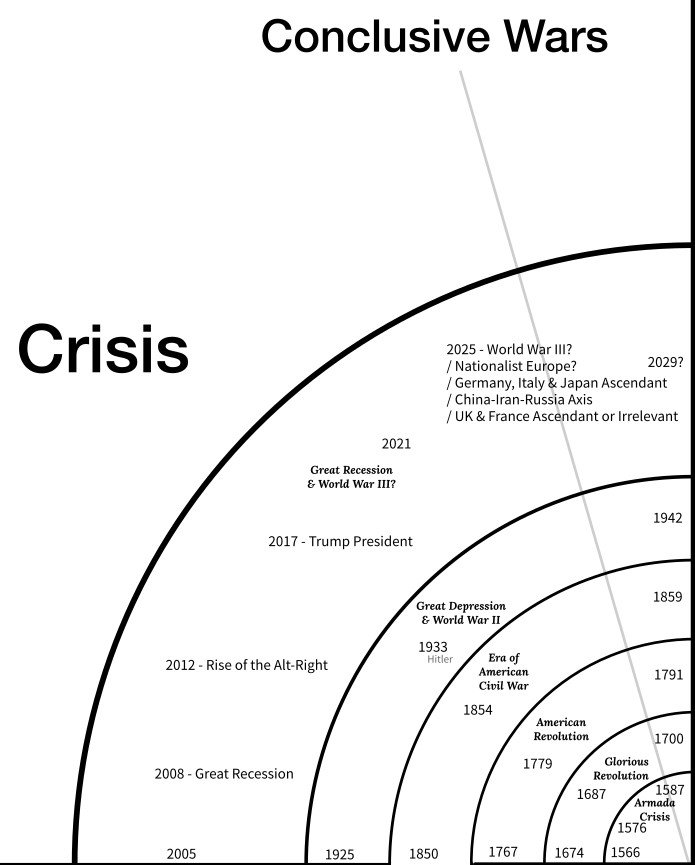Introduction
(Download this essay as a PDF)
This essay demonstrates the relationship between Islam and science/rationality through my effort to reconcile Darwinian evolution with the Quran. I am as much a “Darwinian” as any evolutionary biologist and as much a believer in the literal meaning of the Quran as any conservative Muslim. By showing how these two seemingly clashing worldviews can be reconciled, I hope to clarify many important matters relating to the relationship of Muslims with the modern world and its scientific and rationalist ideals.
How can any rational person believe in religion when there is no proof for it? To put it another way, does not a believer, by the very fact of believing, prove their credulity and irrationality?
The history of religion, including that of Islam, is often thought of as a struggle between “faith” and “reason”; that a Muslim can be as much a rationalist and empiricist as an irreligious person is inadmissible for many. When it comes to a Muslim rationalist, it is assumed that there must always be a “catch”, some laxity of mind or weakness of spirit that makes them inferior rationalists or inferior Muslims. If they are devout, they may wish to be rationalists and empiricists, they may even think they are, but at the end of the day they are merely practicing self-delusion.
To today’s proud secular mind, there is always some sickness or feeble-mindedness hiding beneath faith.
In this essay I will present a form of faithful rationality—inspired by highly futuristic Islamic theological ideas from over 900 years ago—that reconciles faith and reason without there being any “catch”; the world is as rational as any scientist imagines it to be, and as controlled and maintained by God as any mystic imagines it to be. The “Matrix” of the Iranian philosopher and mystic Al-Ghazali (died 1111 CE)—his conceptualization of the universe as something akin to a computer simulation, provides for intellectually honest rationality that in no way places chains on God’s powers, nor does it place chains on science and rationality. One can wholeheartedly believe in the entirety of the Quran in its plainest sense while retaining their independence of mind, skepticism and rationality. This may sound like rather too much for a religious person to claim, but I hope to illustrate it in the first part of this essay.
The essay goes on to use the notion of a “divine template” to reconcile the Quran’s views on creation with the theory of evolution. This notion does not come from ancient Islamic learning; it is my own creation arrived at after years of reading and searching. There is no “catch” here either; the proposed reconciliation will make complete sense to any scientist and any lover of the Quran without requiring either to submit to the other’s authority—once they understand al-Ghazali’s Matrix.
The essay will spend some time building the groundwork for the argument on evolution that follows. Those wishing to only read the part having to do with evolution may go directly to the section “Topology: God’s Template” and read from there.
So-Called “Proofs” of God’s Existence
I do not believe that a proof for God’s existence is possible. Numerous theologians, Muslim, Christian and Jewish, inspired by Aristotle and other philosophers, have proposed theories that they claim prove that God must exist. All such proofs suffer from a fatal weakness recognized by Kant, namely that they assume the logic of this universe extends to what is outside of it
My conscience recognizes the pull of the various “proofs”, but my conscience also recognizes their inherent weakness and rebels against calling them “proofs”. I agree with Roger Scruton when he says:
and while none of them is wholly believable, they serve the useful purpose of showing the rumours of God’s death to be greatly exaggerated.
I believe there can never be hard evidence that compels all rational people to believe in God. There is, however, a preponderance of soft evidence that, once recognized, experienced and accepted by a person, make it unconscionable for them to reject God. Not all humans necessarily get exposed to sufficient soft evidence to make it unconscionable for them to reject God; this is something about which I do not speculate.
In order for me, as a self-respecting human, to be able to continue believing in my religion, I must be able to re-analyze its founding text (the Quran) at any time of my choosing and reach the same conclusion about it—the same way that any re-analysis of one of Euclid’s proofs should always lead to the same conclusion; that the proof is correct. This should happen despite my increase in knowledge and experience as I age, despite all the secular books I read, including highly enjoyable books by atheists like Terry Pratchett. At age 15 I read the Quran and found it true. At 40 I should be able to read it again and find it true, despite the fact that I will be very much a different person by then. An atheist may imagine that as a faithful person’s intellectual horizons grow wider, it will become increasingly difficult for them to continue believing in their faith. That would be true of a false religion. But if a religion is truly from the Creator and is based on an unadulterated text that transmits His words, then the experience should be quite the opposite. The more one learns about the Creator’s handiwork (this universe and everything in it), the more sense His words should make and the more convincing they should become.
So is Islam really that “one true” religion that all of these highly intelligent and admirable non-Muslims failed to get the memo about? It is not my goal to convince readers of Islam’s supposed truth, but this essay should shed some light on certain misconceptions that have prevented such people from taking Islam’s most important text, the Quran, seriously. I believe that a religion like Christianity is truly from God and that it provides a sufficiently meaningful worldview for a person to believe in it while also believing in a scientific worldview. I do not claim that Islam possess exclusive rights to being a religion that can meet the latest scientific challenges.
My goal is to show that the Quran and the theory of evolution have no difficulties with one another once we give the Quran a reading that is innocent of preconceived notions about a supposed incompatibility. I let the Quran speak for itself, and I write as someone who has read this book dozens of times in the original Arabic, besides studying translations and interpretations of it in Kurdish, Farsi, Arabic and English.
The most important reason preventing Muslims from appreciating the Quran’s compatibility with evolution is that they do not take the Quran very seriously. They treat it as a historical artifact immersed in a vast web of cultural and intellectual assumptions. The book’s meaning is dimmed by so many lenses of bias that the book rarely gets a chance to speak for itself.
The religion of Islam is not based solely on the Quran but also on the far greater literature of hadith which transmits sayings and actions from the time of Islam’s founder. If it is shown that the Quran is compatible with the theory of evolution, this does not necessarily mean that hadith is. This issue will be dealt with later in the essay.
While anti-intellectualism and anti-empiricism is common among the religious, it is not true to say that this is a doctrine of the Quran. The Quran speaks of observation and proof in numerous places. Discovering this conflict between the irrationalist tendencies of some Muslims and the seemingly rationalist doctrines of the Quran, I am forced to build my own Islam based on the Quran. It would be a mistake to consider Islam anti-rationality, anti-skepticism, anti-science or anti-evolution merely because many Muslims act as if it is.
The religion of the Quran is founded upon the commandment “Thou shalt question!” The Quran continuously mocks various sections of humanity for not thinking clearly or for believing in superstitions. It also constantly calls its readers to think, to reason, to observe, to analyze, to question. Speaking to those Christians and Jews who claim that only Christians/Jews will enter Paradise, it asks for “proof”. Speaking to pagans, it asks them to show a proof for the truth of their deities. The question “Will you then not reason?” is used 13 times in the Quran.
The Quran claims to be reasonable, and claims to contain much to convince the ulī l-albāb (“those endowed with intelligence and wisdom”, a phrase that is used nine times in the Quran). In verse 39:21, it says:
Have you not considered how God sends down water from the sky, then He makes it flow into underground wells, then He produces with it plants of various colors, then they wither and you see them yellowing, then He turns them into debris? Surely in this is a reminder for ulī l-albāb.
To a skeptic, it will seem especially ironic that the Quran is calling wise and intelligent people to take its claim seriously that perfectly natural phenomena like rain and the growth of plants are God’s doing. There is nothing special about a book pretending that it is convincing or that reasonable people will agree with it. Most books make just such a claim.
However, as a skeptic who wants to make an accurate judgment about the Quran’s logic, I should find out what I could arrive at if I were to take the book seriously. Let us pretend that the book is what it says it is, that it really is reasonable, that it is from an invisible but all-knowing God, and that it can be found as such by intelligent and wise people, where does this take us?
The Quran claims to contain the unadulterated words of God, claims to contain no errors, and claims to enjoy divine protection against corruption. It logically follows that the presence of a single error proves the entire book false, because it either means that God uttered a falsehood, or that he was incapable of protecting His book from corruption, both of which are equally fatal flaws in an all-powerful, all-knowing God.
The Rain of God
In the Quran, God takes credit for various natural phenomena that all have scientific explanations, as in the aforementioned verse 39:21. More of these instances are:
God is He who sends the winds. They stir up clouds. Then He spreads them in the sky as He wills. And He breaks them apart. Then you see rain drops issuing from their midst. Then, when He makes it fall upon whom He wills of His servants, behold, they rejoice.
It is He who sends the wind ahead of His mercy. Then, when they have gathered up heavy clouds, We drive them to a dead land, where We make water come down, and with it We bring out all kinds of fruits. Thus We bring out the dead—perhaps you will reflect.
Have you not seen how God propels the clouds, then brings them together, then piles them into a heap, and you see rain drops emerging from its midst? How He brings down loads of hail from the sky, striking with it whomever He wills, and diverting it from whomever He wills? The flash of its lightning almost snatches the sight away.
We, as rational humans, are supposed to believe that God is responsible for the things described above even though we never see God taking care of these things. Since we never see God’s hand in these matters, it would be right to think that perhaps the universe would go on functioning like normal even if there was no God. We can carry out experiments inside sealed chambers where we can make it rain or snow, what does God have to do with any of this?
Imagine a king giving a speech in a newly conquered city, telling the listeners “I bring you food, so be thankful!” A skeptical person may go to the gates of the city early in the morning to see who it is who actually brings food. Since he never sees the king himself carrying sacks of flour into the city, he concludes that the king lied.
His mistake is that he fails to realize that it is by the king’s order that people are bringing food to his city, so when the king says he is doing it, he is right. If it was not for the king, it would not be happening.
When God claims to make it rain, the fact that His hand cannot be detected in the process does not necessarily mean he is lying. If we are to really find out whether God’s claim is true, we have to investigate further. If the pharaoh of Egypt claims that he makes the sun rise, I would be skeptical and ask him to provide some very convincing evidence before I take him seriously. In all likelihood the sun would rise even if the pharaoh were to die.
So what is so special about a 14-centuries-old book out of the deserts of Arabia that I should take it seriously when it says its writer makes it rain?
Hard and Soft Evidence
Atheists demand hard evidence before they believe in books like the Quran. But such evidence is not forthcoming. The Quran itself promises that it will not be forthcoming:
Are they waiting for anything but for the angels to come to them, or for your Lord to arrive, or for some of your Lord’s signs to come? On the Day when some of your Lord’s signs come (i.e. when hard evidence for God’s existence is seen), no soul will benefit from its faith unless it had believed previously, or had earned goodness through its faith. Say, “Wait, we too are waiting.”
The above concept is repeated in multiple places in the Quran; that once a person has seen irrefutable evidence for God’s existence their faith will no longer be of any worth—since faith will no longer be necessary.
Seeing hard evidence for God’s existence places a terrible burden on humans. This is expressed in one of the most terrifying verses of the Quran in the story of Jesus and the Apostles:
And when the disciples said, “O Jesus son of Mary, is your Lord able to bring down for us a feast from heaven?” He said, “Fear God, if you are believers.”
They said, “We wish to eat from it, so that our hearts may be reassured, and know that you have told us the truth, and be among those who witness it.”
Jesus son of Mary said, “O God, our Lord, send down for us a table from heaven, to be a festival for us, for the first of us, and the last of us, and a sign from You; and provide for us; You are the Best of providers.”
God said, “I will send it down to you. But whoever among you disbelieves thereafter, I will punish him with a punishment the like of which I never punish any other being.”
In the final verse above, the writer of the Quran claims that once the Apostles (and others present) see empirical evidence for God’s existence, this changes the very nature of their relationship with Him. They made a request and God physically revealed Himself to them by responding. If they were to deny God’s existence after that, they would deserve a singularly terrible punishment.
The purpose of this universe, in the Quranic view, is to host free-willed creatures who have the option of rejecting God’s existence–so that an act of will and a submission of the heart is needed for them to become believers in Him, and for this act of will, which they have to repeat every day of their faithful lives, they will be rewarded with Paradise. If God’s existence were ever proven, and the world did not end, this would prove the Quran false, since the Quran claims that hard evidence for God’s existence will only be shown to humanity when the world ends.
Are they waiting for God Himself to come to them in the shadows of the clouds, together with the angels, when the matter has been settled? All things are returned to God.
Once God’s existence is empirically shown, the “matter” will be “settled”, that will be the end of the age-old argument between theism and atheism. Hard evidence would settle the matter; the point of faith is to believe in God without it. This naturally leads to the thinking that religion asks humans to abandon rationality for the sake of faith. But the truth is otherwise, since there is a second category of evidence that is ignored by atheists: soft evidence.
A verse of the Quran is called an āya in Arabic, which literally means “sign”, something on the road that points toward a direction. As for its figurative meaning, the Indian Islamic scholar Hamiduddin Farahi (1863-1930) says in his definition of āya:
That which is used as evidence toward (proving) some matter. It is not the whole of the proof, but it directs you toward the proof.
Each verse of the Quran acts as a truth-pointer. A skeptic can read many of its verses without reaching any conclusion about the book’s truth or falsehood. Open a book of Quran and you will see these verses at its beginning:
In the name of God, the Gracious, the Merciful.
Praise be to God, Lord of the Worlds.
The Most Gracious, the Most Merciful.
Master of the Day of Judgment.
It is You we worship, and upon You we call for help.
Guide us to the straight path.
The path of those You have blessed, not of those against whom there is anger, nor of those who are misguided.
These verses do not contain anything to launch a critique on. God is the Lord of the Worlds, he is gracious and merciful, and he is the master of the Day of Judgment. These claims are unassailable, since they do not make any scientifically testable claims. The verses might as well be saying that the universe is carried on the back of a giant turtle; we have no way of verifying their claims.
However, if the skeptic goes on to read, one thing they will find striking will be the absence of nonsense. How likely is it that a man out of 7th century Arabia could have written a page of cosmological fiction without it containing anything that insults one’s intelligence in the 21st century?
Going on to read page after page, the skeptic’s conscience is seriously challenged. Can he in good conscience say this is human-written fiction? Personally when I read the Quran with a skeptical eye, assuming it was written by Muhammad himself, I cannot maintain my skepticism beyond a few pages without feeling like a criminal, like I am acting against my conscience. At page 5, already impressed with the lack of anything that is obviously false or ridiculous, I may admit that there is a 1% chance that this is from God, but my skepticism makes me continue to say that Muhammad may have simply been a genius, therefore I say that it is still 99% likely that a human wrote it. The rational assumption is that any piece of text you see is human-created, extraordinary evidence is needed to prove otherwise.
At page 10, however, I am further impressed with the Quran’s quality; its way of thinking, its morality and ethics, its continued lack of nonsense, therefore I may end up saying that there is a 98% chance it is human-written and a 2% it is not. By page 300 my conscience may force me to admit that there is a 30% chance that it is from God. By page 600 (the end of the book), I may conclude that there is a 50% chance that it is from God.
I will have many difficulties with the book, such as its taking credit for natural phenomena, but the book, its form and content, make it impossible for me to casually dismiss it. The Quran, for one who reads it with naïve eyes in the original Arabic, is a serious problem that must be addressed if one is to remain honest with himself or herself. If the Quran is true, I must do as it says. I cannot summarily dismiss it, since I have acknowledged that there is a 50% chance it is from God. Therefore the Quran throws me into serious intellectual turmoil; I can neither dismiss it nor accept it…yet.
There are converts to Islam who reached this stage then remained there for years, unsure whether it would be right to make the jump into faith, yet unable to forget the Quran and go on as before. A Scottish man described his personal journey to Islam thus:
The Qur’an really shook me. It’s quite a scary book to read because it tells you so much about yourself. Some things that I found out about myself I didn’t like. So I decided to make some changes.
And I knew what the end result of this process would be: I would be a Muslim.
So I kept on reading. I read it three times, looking for the catch. But there was no catch; I was quite comfortable with everything.
“I was quite comfortable with everything” is more than I can say (it took me many years to fully justify the entire book to myself). The article led to over 800 comments in which the writer was severely attacked by his fellow citizens for buying into this barbaric religion. Personally, until recently, I have never been completely comfortable with the Quran, in that there were certain things in it that I couldn’t fully justify to myself. Despite those points of discomfort, the rest of the book was a tremendous, non-dismissible challenge to me.
At some point, the evidence starts to feel overwhelming that the likelihood of the truth of the Quran is greater than the likelihood of its falsehood. Once that happens, once a person believes that there is more than a 50% chance that the Quran is truly from God, he or she starts to feel that it is something tantamount to a crime against conscience and rationality to reject the book or ignore it. And that is where faith and submission begin.
The reason I believe in the Quran is the same reason so many scientists in the late 19th and early 20th century believed in Darwin’s theory of evolution despite never actually observing evolution take place. They both get too many things right, which makes it impossible to casually dismiss them in good conscience.
For the Quran, I can list a few of those things, although each verse of the Quran can be thought of as one of those “things” that makes me believe in it.
- The aesthetic experience of the Quran. It is not without reason that the Quran’s literal meaning is “The Recitation”. The Quran is meant to be experienced as a recited thing, and for a person who speaks Arabic and experiences a good recitation of it, the Quran compels them to pay attention to it and to take it seriously, like any great work of art. The opening verse of Mary (chapter 19) starts with a set of seemingly meaningless sounds: “Kaaf haa yaa ain saad.” In an English translation these look like a bunch of strange and possibly unnecessary sounds. In a good Arabic recitation, however, they are a very compelling set of tones that tell the listener that a very serious symphony is about to start. They transport the listener into the atmosphere of the Temple in Jerusalem in which the story unfolds. It is not only rational arguments that have a “rightness” to them; aesthetic experiences also have rightness (the architecture of a beautiful church looks “right”, while a badly designed one looks “wrong”). There is something deeply “right” about the Quran when experienced. While the aesthetics of the Quran do not prove that it is from God, they cast very strong doubt on the possibility of a human having composed it. The soul or conscience wishes it to be from God. If it was filled with absurd nonsense, we as rational beings could dismiss the conscience’s desire. But there is nothing in it to insult the rational mind; rather, it contains much that satisfies it too.
- The Quran’s zero-tolerance policy toward the charging of interest (also the Bible’s policy according to a minority of Christians). The evils of usury are long-term and require deep and lengthy analysis to bring them to the surface, so much so that today perhaps one among a thousand economists cannot be found who appreciates how it leads to an unsustainable economic system where an over-class of usurers (lenders, i.e. the banks) slowly take control of the economy, as has happened in the United States and Europe.
- The fact that the Quran bans gambling. Without this ban, usury could be practiced in a different guise.
- The zakat system, in which the poor charge an annual 2.5% interest on the uninvested and speculatively invested wealth of the rich (this system would be useless without banning usury, it takes a genius to plug that loophole, and the Quran does it).
- The fact that in 600 pages written in the 7th century CE, it does not contain a single statement that is provably false, or that contradicts another part of itself. This is a highly unlikely achievement for a human writer, especially one from so far back in the past.
- The moral philosophy of the Quran, where moral integrity and justice are always paramount. Killing a single innocent human is similar to killing all of humanity, which means that there can never be such a thing as a utilitarian murder. The end never justifies the means. No evil done in the name of the greater good is justified.
- The writer is always superior to me. I have never had a similar experience with any other writer. As I grow intellectually, I am made better capable of critiquing the thinking of others. The Quran has survived this process.
- The Quran’s non-Arabian character and the unusual restraint of the writer in not engaging in the typical rhetoric of the time. This is perhaps the greatest clue to its truth. Someone who studies Arabic poetry from that period and the fabricated words of revelation of Musailamah and other “false prophets” will see that while all of the literary speech from that era has a distinctly Arabian character, full of hyperbole, self-aggrandizement, tribalism and bad logic, the Quran does not. The Quran was brought to us by an Arab from the heart of Arabia, yet it does not have an Arabian character.
- The fact that the Quran points out various mistakes of Prophet Muhammad. It severely rebukes him for ignoring a blind man who came to him for guidance (chapter 80), cautions him not to repeat the offense of taking prisoners when he was not supposed to (8:67-68), and criticizes him for accepting the excuses of a certain group of Medinans not to join a certain battle (9:43). While he could have invented these verses as an all-too-clever device to convince skeptics that the Quran came from a higher power, they do lend soft support to the Quran’s own theory of itself, that it is a message given to the Prophet, rather than something invented by him. It shows far too much imagination for that time for a prophet to criticize himself in such a severe manner.
The aesthetic experience of the Quran and its contents both strongly support its own theory of itself (that it is a book from God). A person who rejects the Quran after experiencing it aesthetically and recognizing the unlikelihood of a random man from Arabia composing it is committing something that is both unconscionable and irrational: unconscionable because they are repressing their conscience’s response to the aesthetic pull of the book, irrational because they are acting against probability theory. The rational mind, once it experiences the Quran aesthetically and affirms the plausibility of its contents, recognizes that the likelihood of it being from God is greater than the likelihood of it being a man-made work by an uneducated and illiterate Arab. For such a person to dismiss the Quran is as irrational as dismissing the news that a great storm will affect the area they live in in an hour despite dozens of data points all pointing to the likelihood of such a thing taking place.
The above are not the reasons why I believe in God. They are the reasons why I believe that the Quran is from God. As for my belief in God, I consider it extremely likely that all humans already half believe in God, in some sacred and transcendent person whose eyes are on them at all times. The Quran is a vehicle for strengthening my belief in God, but it is not the only vehicle, and it is not necessarily the strongest one. For me, it feels as if to merely exist, to merely be a self-conscious subject who looks out onto the world, is a very compelling force pointing to God’s existence, making it nothing short of criminal for me to deny Him.
Describing why I believe in the Quran feels similar to describing why I am in love with someone. I can mention a few obviously good qualities of the beloved, but every reason given for this love cannot help but feel weak and absurd, since it does not capture the real thing.
If the Quran is so compelling, one may wonder how there can be Arabic-speaking atheists who read the Quran and reject it. The reason, I would say, is that due to the lack of hard evidence, there is always room for doubt. Accepting the truth of the Quran feels like a “jump” for those who have not accepted it yet. One cannot easily dismiss the Quran in good conscience, but one is not compelled to accept it either. A person’s biases may also strongly affect the amount of charity they give to the text; the Quran mentions that God has beautified the sky with “lamps”. A person who is predisposed to think very negatively of the Quran will see in such a statement a proof for the superstitious and unscientific nature of the Quran, while Muslims will see it as a poetic reference to the stars.
We can now discuss the topic of rain. God could claim credit for making it rain for three reasons:
1. Purposeful invention
God designed and built a universe in which rain happens, for the very purpose of having it be a help toward the evolution and sustenance of the creatures that would one day come about on Earth.
2. Operating the universe
Let us imagine that the universe is a simulation sustained by God, what I call al-Ghazali’s “Matrix”. The word Matrix is a reference to the popular film of the same name, in which the characters famously live inside a simulated universe. The Matrix theory enabled al-Ghazali to free God from the chains that previous philosophers had tried to impose on Him. Islam’s earlier philosophical movements, inspired by Greek thought, were stuck within the Aristotelian paradigm of considering the universe all that there is, and thinking that God would have to follow the same rules and logic seen elsewhere within our reality.
Al-Ghazali, who was developing lines of reasoning started centuries before, was able to think “outside the box” of this universe, recognizing that there was no obvious reason why God should be stuck following the same rules as everyone else if he was truly transcendent and all-powerful. In his view, this universe is like a simulation maintained by God from the outside, who is under no obligation to follow the rules internal to the simulation. When a tree catches fire, it is not because matter decided that catching fire was a good idea at that instance of time, but because God changed the universe. Explaining this concept would have been extremely difficult in the past, but today, thanks to video games, we have a ready-made illustration. Inside a video game, if you see a tree catching fire, it is not because the atoms and molecules of the tree came in contact with a hot object that lit them. We know it is a fake, imaginary tree, and that the reason it caught fire was because the computer that runs the video game knows that when a hot object touches the tree, a fire should start. If you are stuck inside a video game, you “know” that when hot objects touch trees, the trees catch fire, and you may see this as a simple rule of nature that any scientist can verify. But if you come out of the video game, you realize that the whole thing is a set-up; the things you considered rules of nature are actually computer instructions that can be changed by a video game designer. He can change the code so that when a hot object touches a tree, it no longer catches fire.
Al-Ghazali was answering the challenge of the philosophers who, like most atheists, were incapable of thinking in the “fifth” dimension (in and out of the universe), and who could see no way of reconciling the attributes of God as taught by religion with their ideas about nature, so that they were forced to say that God had to follow certain rules dictated by nature. These philosophers could only think in the four dimensions of space and time. Al-Ghazali added a new dimension; the inside and the outside of the universe, and through a few simple examples showed that there is no conflict between nature and God. Nature is to God as the simulated world inside a video game is to the computer that runs it.
According to this theory, this universe would be a blob of inert, unmoving matter if God stopped animating it. If this theory is true (and there is no evidence that it is false), then saying that the universe would continue existing or operating normally even if there was no God would be similar to saying that the world inside a computer video game would continue to be there even if you take away the computer. It is to be so enamored by an illusion as to deny its source.
An atom, according to the Matrix theory, has no power or will to exist or move. It is God who has to sustain the existence of everything in this world and cause them to move when. This means that in the case of rain, God has to cause steam to rise, He has to make it go where it is supposed to go in the sky, He has to bring it together into clouds, and then He has to take it to where it will eventually become rain.
He does all of these things so reliably, that we start to think of them as “natural” phenomena that just happen without needing something to make them happen. But this universe, if God decided to “let it go”, would disappear as if it had never existed, similar to turning off a computer: “God upholds the heavens and the earth, lest they cease (to exist). And were they to cease, there is none to uphold them except He. He is Most Clement, Most Forgiving.”
3. Intervention.
While the above two points admit for the possibility of God being responsible for the phenomenon of rain in general (the way that a computer is responsible for the rain that happens inside a video game), we need something more. God seems to claim that He purposefully sends rain here and there (especially in verse 24:43 quoted above), in directions He wants, meaning not necessarily directions that only obey the laws of nature (even if the laws nature are of his own making). God seems to claim that his agency goes into deciding when and where rain happens—that it is not mere chance caused by the laws of nature. The way that God could make this happen is by making it happen regardless of the laws of nature, because he has the power to do that.
This, of course, would be impossible to detect, according to his plan, since God does not want the discovery of hard evidence for his existence. Even if we could build a machine that perfectly predicted rain around the world, so that any aberrations caused by God’s decisions could be seen, God could change what the machine shows.
Saying that God intentionally makes it rain here and there is to claim a miracle happens, since one is saying this rain is happening due to a supernatural phenomenon (God), not due to a natural, scientifically explicable phenomenon. To prove a miracle, an equally miraculous piece of evidence is needed. For those who have experienced the Quran and accepted it, the Quran is sufficient evidence, although the evidence is not hard, in that there is room for doubt that has to be bridged by the conscience every day. Experiencing doubt is quite natural for a believer. When this happens, they go back to the things that convinced them their beliefs are true, such as the Quran, examine them again until both their rational minds and their conscience are overwhelmed with the recognition of their truth.
The Quran claims that God, who is in charge of this simulation-like universe, is personally responsible for rain. This is similar to saying that the computer that runs the Matrix decides when it should rain and what rain should be like (while someone stuck inside the Matrix might say rain happens due to perfectly “natural” laws of the universe).
In other words, if it is true that this universe is a simulation operated by God, then it logically follows that God could take credit for making it rain.
By being outside the simulation, God, if he really exists, can make it rain while making his own role in the matter undetectable. Therefore the fact that rain can be explained scientifically does not tell us anything about God’s role in the matter; what we call “science” is nothing but a description of how God operates the universe.
The above does not prove that religion correct in its claims regarding God’s role in nature. It, however, shows that the existence of a conflict between religion and science in this matter is illusory; we can be rational scientists inside the universe, while believing that outside the universe God is operating things, similar to being in the Matrix while acknowledging how it is run from the outside. We fully support scientific explanations, and we will not bother non-believers with supernatural explanations, since that requires that they believe in God in the first place. Since they do not, there is no point in telling them about God’s potential role in undetectably making it rain in certain times and places.
A skeptic could rightly say that saying God is undetectably involved in making it rain is like saying invisible magical fairies make it rain. The reply is that yes, it is just like that. But in our case, we have extraordinary evidence to support our thinking; the Quran with its preponderance of soft evidence in its favor, while a person who claims that invisible magical fairies make it rain has no evidence, soft or hard.
A Muslim scientist can study the weather as a purely natural system, while also believing in God’s power to direct it as He wills, so that they can thank God when a tornado avoids their neighborhood. This is like thanking the Matrix operator for letting you have an easy time of it inside the Matrix. And when thanking God for getting the job you wanted, you do not claim that your getting the job does not have a scientific explanation—you merely admit that there is sufficient room for undetectable divine action within this universe, so that God could have made the crucial difference in whether you got the job or not while keeping Himself hidden in the matter. From a scientific point of view, this is an entirely useless point of view; whether it is true or false makes no difference to science. And that is the point; we are merely claiming that thanking God for getting a job is not irrational if one believes in God, since it is just like thanking the Matrix operator for arranging things smoothly for us inside the Matrix. One can thank God for every great and small blessing in their lives while treating the world as a perfectly scientific system; God is ever-present and ever-undetectable at the same time. One never knows if God did not make the crucial difference when something, anything, happened or did not happen.
When I write of the lack of incompatibility between the Quran’s theology and science I do not mean that we should bother non-believers with such topics; we should only do so if they bring it up by saying or implying that this or that scientific fact or technical discovery somehow exposes the existence of shaky foundations within religion. What they say is provably false if we imagine the universe as a simulation that operates rationally inside while being divinely operated from the outside. An atheist might say: (1) science explains rain perfectly (2) therefore it is false to claim that God makes it rain.
What we say is: (1) science explains rain perfectly (2) if God exists, He could be in charge of a Matrix in which He makes it rain according to scientific principles (3) therefore the matter at issue here is not rain, but (a) whether God exists or not and (b) whether this universe is like a Matrix or not.
There is no proof that God does not exist, and there is no proof that this universe is not like a Matrix, therefore any claim that scientific explanations contradict God’s existence are automatically and always false. An atheist who wants to convince me that God does not exist is completely wasting his time if he talks about scientific explanations, since I too believe in all of that. To stop wasting his time, he will have to do one of these three things:
- Prove to me that God does not exist.
- Prove that the soft evidence I rely on for having faith in God (the Quran) is false.
- Prove to me that this universe could not possibly be a Matrix.
Atheists have so far failed to provide any of the above proofs. They continue to waste their time propounding science as a cure for religion, not realizing that al-Ghazali made that whole line of argument irrelevant nine centuries ago through his discovery of the “fifth dimension”.
Another phenomenon for which God claims direct agency is the formulation of the genetic makeup of humans during conception:
It is He who forms you in the wombs as He wills. There is no god except He, the Almighty, the Wise.
When a father and a mother’s genes recombine, there are 64 trillion different possible combinations that could be created. God claims to have a hand in choosing which combination ends up actually taking place. Again, God can claim responsibility for forming our genes in the womb through the three methods mentioned earlier: Purposeful invention, operating the universe and intervening when he wants. Similar to weather events, the process of genetic recombination is so immensely complex and chaotic that God does not need to do anything to hide his hand in the matter; his interventions would be easily explainable as mere randomness, which is as it should be.
In verse 67:3 of the Quran, the writer appears to take pride in the lack of “glitches” in this Matrix:
He who created seven heavens in layers. You see no discrepancy in the creation of the Compassionate. Look again. Can you see any cracks?
In effect, the Quran tells us that God exists, but that we should be scientists in our dealings with nature: any glitches in the simulation (any supernatural phenomena pointing to him) would be hard evidence of his existence, but he says there will never be hard evidence for his existence until the end times, therefore if we detect anything provably supernatural and the world does not end, that in itself could be considered a refutation of the Quran.
The doctrine of considering the universe a simulation-like thing controlled by God is known as occasionalism. It has been unjustly criticized for promoting an anti-science and irrationalist attitude, since it teaches that things only appear to be following scientific rules when in reality they are following God’s commands. But this criticism focuses on a small area of Islamic thought and ignores its wider context. The Quran teaches that the universe is a simulation-like thing so that the laws of nature are merely byproducts of God’s choices, it also teaches that we should act rationally and expect the universe to act rationally too: for example, it tells us that if we give away too much in charity we will get poor, which as any materialist will tell you, is a true fact of nature. Occasionalism only promotes irrationality if it is surgically removed from the rest of the Quran’s teachings. The historian and Islamic scholar Ibn al-Jawzi (died 1200 CE), although not a very original thinker, uses the Quran’s rationalist advice (such as that of the necessity of preparing provision for long journeys) to criticize certain lines of Sufi thought that taught that God would save and take care of His true believers without regard for the material reality around them. Some of them, for example, desisted from work thinking that God would provide for them regardless of the laws of economics. That is irrationalist because it expects God to materially intervene in this universe to take care of certain humans, which is opposed to what the Quran teaches. The Quran teaches us not to waste money (17:26), not to do physical harm to ourselves (2:195), to break our fasts if we are ill (2:184), and to perform the Hajj pilgrimage only if we have the material means to perform it (3:97) rather than setting out come what may. The Quran does not teach its believers to march into fires for the greater glory of God. It teaches them to view this world as a Matrix controlled by God, a Matrix that has rational rules that must be respected.
There is, of course, historical evidence of some Muslims acting irrationally (although the Western imagination often greatly exaggerates this as any good Western historian of Islam can tell you), but what Muslims do within their limited historical and cultural perspectives does not necessarily have a one-to-one relationship with the Quran’s teachings, therefore we should look at the Quran itself to see what it says.
Like any scientist, I never expect to detect anything supernatural in this world. Like any mystic, I believe my life and the rest of this universe is entirely under God’s control and command. My attitude is that of the mystic-scientist; not the crackpot who thinks quantum theory proves the healing power of crystals, but the scientist who considers science, hard, rational science, to be merely a way of looking at God and His works. From this standpoint I have no desire to deny science—this would be denying an aspect of God’s handiwork. And I am not ashamed to pray to God and ask Him for His help and support because I know that He can do anything He wants (as the Quran teaches), that He answers prayers (as the Quran teaches), while also expecting this world to continue operating under clearly-defined rational rules (as the Quran teaches).
In short, the Quran teaches that God is present but hidden. It does not tell me to expect nature to work one way today and a different way tomorrow; it teaches me to expect nature to act rationally, and it teaches me that if God intervenes in my life, it will be done undetectably, through means that always have rational explanations. I will never argue with an atheist about whether it was God or the surgeon who saved my life after an accident, because both views are true at the same time, and there is no point in bothering the unspiritual about God’s role in this world. From this side of the wall that separates us from the Unseen, it was the surgeon, from the other side, it was God. This is not to discount the surgeon’s role; maybe it was their years of determination and hard work that enabled them to accomplish their task. This simulation is a system controlled by God, but humans—who have free will—are plugged into it and make changes to it, again, similar to the Matrix film. We can be credited with our choices since we have free will, but we have no power to make the Matrix behave one way or another. We choose, God changes the Matrix in response and does it so reliably that we get the illusion that we are really in charge of our bodies and can make changes to the universe. This is similar to being stuck inside a video game and thinking you can fly because the video game allows you to. In reality, it is the video game that gives you all the powers you enjoy.
Yet another place where God claims direct responsibility for physical phenomena is in his providing sustenance to humans:
Or, who originates the creation and then repeats it, and who gives you livelihood from the sky and the earth? Is there another god with God? Say, “Produce your evidence, if you are truthful.”
And whosoever fears God, He will create for him a way out. And He will provide him with sustenance from where he does not expect.
The second verse above implies that God has a direct hand in providing sustenance, because he says that if we fear him, then he will provide. This is a central concept of the God-human relationship, repeated often in the Bible and the Quran. For example, in the Old Testament Book of Isaiah, God informs us:
10 If you extend your soul to the hungry And satisfy the afflicted soul, Then your light shall dawn in the darkness, And your darkness shall be as the noonday. 11 The Lord will guide you continually, And satisfy your soul in drought, And strengthen your bones; You shall be like a watered garden, And like a spring of water, whose waters do not fail.
In the Quran, Moses says:
“And [remember] when your Lord proclaimed: ‘If you give thanks, I will grant you increase; but if you are ungrateful, My punishment is severe.’”
If God did not intervene directly in the affairs of humans, there would be no way for this contractual relationship to be maintained. If we fear God, God will provide for us. We act, God reacts by arranging the events inside the Matrix favorably for us. For God to react, He has to intervene directly, but undetectably, in our universe. Once we think of the universe as a divine simulation, then intervention will be nothing out of the ordinary. Every movement of an atom is itself a divine decision; it would not happen without God making it happen. An intervention is merely a different decision where God, instead of operating the universe according to the laws of nature that he has laid down, he operates the universe in a certain time and place according to different laws that operate on a higher plane and override the laws of nature, such as the divine law of rewarding thankfulness.
A family may live in a house that is in danger of collapsing. If nature were to take its course, the house would suddenly collapse without warning. But God can intervene, causing unsettling creaking noises to come from the house’s structure for a few days before the collapse—giving the family ample warning and preparation time for responding to the problem. It would be foolish for a believer to expect God to warn them of every threat, and I have never met an intelligent Muslim who thinks thus. But as a spiritual person, I thank God daily for all the problems He has helped me avoid or solved for me.
Topology: God’s Template
The theory of evolution seems to claim that the creatures on Earth could have come about regardless of God. The religious think it is a God versus nature problem. This mistake is also made by atheist scientists who think that finding a scientific explanation for natural phenomena disproves God’s role. As the previous discussion showed, according to the Quranic worldview, scientific explanations are merely man-made descriptions of the way God operates the universe. Therefore the existence of scientific explanations is not merely a non-problem for religion, it is required by it. The Quran teaches that God will keep Himself hidden, therefore all that we see around us should be so natural and rational that atheists should always have the choice of remaining atheists. Humans must forever maintain the choice between faith and disbelief. The universe provides many signs that point toward God, and the various “proofs” of God’s existence strongly suggest the need for the type of God they describe, but there is always a place for doubt.
Topology refers to the physical configuration of the universe; the physical constants that govern the universe (such as the speed of light), the placement and chemical composition of the galaxies, stars and planets, and the placement of the continents, mountains, rivers and oceans on Earth.
You are probably familiar with the concept of a topographical map. This is a type of map that shows which areas have high elevation and which areas have low elevation. A country’s topography refers to those features of the country’s land that show up on a topographical map. We can say a country has a “rugged topography” if it has many hilly and mountainous areas and few areas of flat planes.
Topology, on the other hand, in the specific usage of this essay, goes beyond topography to account for the entirety of the physical configuration of an area of space. We can say this galaxy has a different topology from that one, which could mean that the arrangement of their respective stars and planets are very different. We can also say that this universe has a different topology from another universe, meaning that this universe has different physical constants, chemical compositions, and/or galactic arrangements compared to the other universe.
Topography is 3-dimensional; a topographical map extends a 2-dimensional map by adding elevation, making it 3-dimensional. On the other hand, topology is n-dimensional; it has as many or as few dimensions as one cares to name. A topological map of a galaxy could account for its 3-d appearance like a topographical map while adding temperature, the strength of gravity, the velocity of its spirals, and so on and so forth, adding as many additional factors into it as one wants. Each additional factor we add is a new “dimension”.
Topology is critical to evolution. No evolution can take place unless the topology of the universe and the relevant planet is just right for it. Very minor differences in the universe’s topology would have made life impossible to exist (if the gravitational constant had been just a tiny bit larger or smaller, for example). Very minor differences in the topology of the earth would have led to the evolution of extremely different creatures than the ones we have now, and could have made the existence of humans impossible.
Imagine if the earth was entirely an ocean planet. On such a planet, there would be no way for land animals to evolve, and therefore there would be no humans. The number of all species that would evolve on such a planet would likely be far fewer than the 8.7 million species we have on the earth today.
The design of a planet is crucial to the types of creatures that evolve on it. And it follows that if you could design a planet with the right topology, you can create any type of creature you want. And perhaps it is for this reason that God says:
Certainly the creation of the heavens and the earth is greater than the creation of humanity, but most people do not know.
27. Are you more difficult to create, or the sky? He constructed it. 28. He raised its masses, and proportioned it. 29. And He dimmed its night, and brought out its daylight. 30. And the earth after that He spread. 31. And from it, He produced its water and its pasture. 32. And the mountains, He anchored. 33. A provision for you and for your animals.
God might be saying that the fact that he designed our universe’s topology is a greater accomplishment than the fact that he created humans. This would make a lot of sense if the existence of humanity was nothing more than a byproduct of the universe’s design. When God created the universe, He did not merely create a lifeless system of stars and planets. He created a universe in whose design was embedded the program that would ultimately lead to the existence of 8.7 million species, including humans.
Topology–the way the universe is configured–is a template that God uses for creating creatures.
Imagine if Earth lacked mountains and rivers. Could humans or human-like creatures evolve on such a planet? It is unlikely, perhaps impossible. The design of the planet and the universe in which it exists decides what types of creatures can evolve on that planet, meaning that the designer of the universe can be fully credited with the creation of all the creatures that exist inside that universe if the designer had the creation of those creatures in mind to begin with.
To create apes, God can either create apes from a puff of smoke, or he can create a universe in which apes can evolve after billions of years. From his perspective, the two things are equally easy. It is just that the second choice enables him to ultimately create humans who have the choice of denying his existence. It allows him to retain his plausible deniability. The issue of human evolution is more complicated than the issue of the evolution of other creatures and will be dealt with specifically later on.
Through the Quran’s consistent references to mountains, rivers, seas and the design of the earth and the “sky”, God explains the topological design of the universe in detail and says that this is of greater importance than the creation of humans, because he is in effect describing the template or the intelligently designed factory that led to the existence of humans.
By considering the universe’s topology a template created by God, we can credit him with creating all of the creatures on the earth without having to deny evolution. At the Big Bang, God created the universe with the exact conditions required to create life on one of the planets inside it billions of years later.
Dynamic-Kinetic Equilibrium
How can non-living matter lead to the complex biological machines that exist in all kinds of creatures? Does this not go against the idea of entropy—that the universe continues to break down and become simpler over time?
It is possible if we provide (1) energy sources and (2) complexity-inducing topologies, leading to what can be called a dynamic-kinetic equilibrium, in which matter stays in a state of heightened complexity as long as certain conditions around it continue to apply.
Both of these conditions come true on Earth, where energy is available in the form of sunlight, geothermal energy and tides, and where the topology of the earth and the universe in which it is contained create an environment in which life can not only originate, but diversify by finding niche after niche in which it can survive.
The origination of life requires that dead matter somehow join together and increase in complexity. This is somewhat like expecting a pile of rocks to join together and walk up a hill. The difference is that in the world of atoms and molecules, things join together and increase in complexity all the time, as can be seen in the highly complex organic compounds found inside meteors.
All that’s needed is the right mixture, and usually a source of energy, and from this, extremely complex molecules can evolve. This is a fact of chemistry.
The question is: just how complex can these natural structures become? Someone who denies abiogenesis (the origination of life from non-living matter) would say that there is no way that the complexity of these randomly formed molecules could increase to the degree seen in living things. This would mean that life could never evolve from non-living matter.
But someone with sufficient imagination would see that it might be possible given a large enough test chamber, ample building blocks of life, water, energy and hundreds of millions of years, and most importantly, a designer who put all of these together in just the right way to create life.
The chances of life happening by random are so small that they tend to zero. But if there is a designer who created the right universe for life to come into existence in it, then the origination of life would no longer be random, it would very much be planned. Therefore believers can acknowledge the possibility of abiogenesis without supporting the idea that life came about randomly. We instead can say that life came about because the designer got all the conditions right at the beginning of the universe.
Physicists say that if the Big Bang had taken place the merest fraction of a second slower or faster, the galaxies couldn’t have formed, and humanity wouldn’t have existed. To create humanity, what God had to do was get the conditions of the Big Bang exactly right, and 13.8 billion years later human-like creatures came into existence on one of the planets inside the universe created by the Big Bang.
The timescales involved in this, and the amount of intelligent design necessary, make it very difficult for people to imagine this actually taking place; that is, imagining God creating humans in such a complex and roundabout way.
But if you imagine the whole process taking just one second, it becomes easier to believe. Imagine a god who is holding a blob of matter in his hands. He parts his hands, the blob expands with it, and in just that second, you see a planet inside that blob of matter on which certain creatures live. Should a god not have such power? And can such a god not claim responsibility for the existence of those creatures if the nature of the blob of matter and the way he expanded it is all that lead to the existence of those creatures, and if the way he did this was intentional, with the aim of creating those creatures?
Do the disbelievers not see that the heavens and the earth were one mass, and We tore them apart? And We made from water every living thing. Will they not believe?
We constructed the universe with [our] capability, and We are expanding it.
The Islamic version of intelligent design (the phrase Christians use to refer to God designing humans and other creatures) can be called topological programming. When you want to create a creature or group of creatures, all that you need to do is design a universe with the right topology. In this topology would be programmed the existence of those creatures, and after millions or billions of years, which, if you are God, could be no length of time at all, those creatures would evolve on the planet or planets of your choice.
To wrap your head around this idea, think of a computer program that lets you design living creatures, but instead of letting you design the creatures directly by choosing their shape, color and anatomy, it asks you to design a universe that would lead to the type of creature you want. This computer program shows you a box where a picture of the creature would be, but currently it is blank. And it gives you various boxes where you can input various numbers. It asks you for the size of the universe, the speed of its expansion, the external shape of it, and the various physical constants that go into that universe, such as the speed of light and the gravitational constant. By making the tiniest changes to any of these variables, the creatures it shows you on the screen change immensely. Get the numbers just right, and you will get humans, among the trillions upon trillions of other possible creatures you could create. Increase the number for the gravitational constant and your humans may get smaller. Increase it beyond a point and the human disappears; the universe you are designing will no longer be able to support humans.
This is what topological programming means; designing universes with the specific aim of seeing creatures originate and evolve inside them after billions of years. A topological programmer is a designer of universes, and that is what the Creator is.
There is no difference between God creating all the creatures on the earth by a single command that turns a large puff of smoke into all of them, which is the way our ancestors used to think how creation should work, and creating them by designing and sustaining a universe that would lead to their existence after billions of years. The end result is exactly the same, it is just that the second method is harder for the human brain to understand and appreciate, and it helps hide God’s role in the matter.
There is no clash between Darwin’s theory of evolution and intelligent design (except when it comes to the evolution of humans, which will be dealt with below). The theory of evolution is merely telling us about God’s means of designing creatures, which is far cleverer than anything one tends to imagine. To design an elephant, God does not need to create an elephant from a puff of smoke. He instead brings a blob of matter and expands it, and billions of years later elephants will exist on a planet or many planets inside that expanding blob. God has the power to create a new universe full of millions of planets all of which are inhabited by elephants, merely by designing a universe with the right topology to lead to such planets and creatures.
Evolution is only a challenge to God if we cannot think outside the box of this universe. But once we see the universe as a mere simulation designed by God, evolution becomes a God-made design feature of the universe. From this view, evolution is a testament to God’s incredible power and ingenuity; he can create creatures as intelligent as humans in such a round-about way that they would be able to deny the need for a Creator, and despite their very best efforts at detecting Him, they are never able to do so.
Topological programming does not only explain evolution; it also explains the origin of life. The same way that God can program evolution into the universe’s topology, He can also program the origination of life into it and take credit for it.
There is no clear statement in the Quran saying artificial life cannot be created, and humans creating artificial life does not take away from God’s greatness. If we were to create it, we would be merely copying him, from inside a universe that he designed and that he sustains.
The following verse seems to suggest that humans cannot create artificial life:
O people! A parable is presented, so listen to it: Those you invoke besides God will never create a fly, even if they banded together for that purpose. And if the fly steals anything from them, they cannot recover it from it. Weak are the pursuer and the pursued.
But this verse can actually be used as an argument for the possibility of humans creating artificial life. The second part of the verse says, “And if the fly steals anything from them, they cannot recover it from it.”
Is it impossible to recover things stolen by flies? As a general rule, it is not impossible to catch flies and take back whatever they have stolen. What the verse might actually be saying–which is a point repeated many times throughout the Quran–is that we have no inherent power of our own; we have zero power over this universe: it is ultimately God who operates it. This means that we have no power to recover something a fly stole except when God enables us by moving the relevant atoms, photons and energy fields for us so that we can carry out our intention of recovering something the fly stole. God is telling us that it is he who is letting us have a remote control that enables us to control our bodies or avatars in this universe, a connection that can be severed by God at any moment.
By the same reasoning, we have no power to create artificial life, except when God enables us, by maintaining and operating the universe. Both of these things might be possible for us to do, if God makes them possible, and both would be impossible, if God makes them impossible. By the logic of the verse, creating artificial life might be as possible as recovering something stolen by a fly.
Still, it is possible that humans will never be able to manufacture life, as predicted by the great science fiction writer Frank Herbert in his Dune series, novels set thousands of years in the future. Perhaps there really is something special about life and perhaps at some point God had to breathe life into Earth to jump start the process of evolution that would eventually lead to the rest of all of the creatures we see on Earth. We do not know, and it is best that we do not issue definitive statements on matters we know little about.
I believe God is great enough to program the origination of life into the universe’s topology, meaning that he can create a universe that leads to the origination of life without him having to intervene afterwards to plant life on it. Questioning the possibility of this happening is actually questioning God’s greatness and creativity; it is saying that God is incapable of creating life using topological programming.
Why would God create life in such a roundabout way instead of creating it directly? This is not just some absurd mental gymnastics; there is a very strong reason for it. Creating life in such a way allows for the creation of the rarest species of all. No, not humans.
Atheists.
The God of the Quran wants His existence to be impossible to prove. He wants there to be the possibility of disbelieving in him, and that requires that his own hand should be invisible from direct measurement. God wants it to be possible for humans to think that they are alone in a universe without a creator. It should be possible for humans to deny him, ignore him and go about their entire lives acting as if he did not exist. And that requires that nature should appear supreme and unchallenged. Evolution is just the right way of achieving this goal of maintaining God’s plausible deniability.
Human Evolution
The Quran describes the creation of humans in detail, which causes many Muslims to automatically reject evolution, thinking that evolution goes against the Quran:
We created the human being from clay, from molded mud.
And the jinn We created before, from piercing fire.
Your Lord said to the angels, ‘I am creating a human being from clay, from molded mud.’
‘When I have formed him, and breathed into him of My spirit, fall down prostrating before him.’
So the angels prostrated themselves, all together.
We know that humans share many of their genes with chimpanzees, rats, yeast and even some viruses. Are the above verses false, or is evolution false?
The answer might be in the Quran itself, in this verse:
The likeness of Jesus in God’s sight is that of Adam: He created him from dust, then said to him, “Be,” and he was.
We know from the Quran that Jesus was a human. Yet the Quran says his creation was similar to that of Adam. There is an important clue in here.
How did God create Jesus? He used some clay to create a human whose genetic code was like any other human, and at a time when other humans were around. In the same way, God could have created Adam at a time when humans or human-like creatures already existed on Earth (and existing, of course, by God’s design, who designed the topology that lead to the existence of such creatures).
God already had the genetic code for humans before the creation of the universe. He embedded that code into the universe’s topology. For example, a minimum number of continents of a certain shape may be necessary on a planet for humans to exist on it. For humans to evolve on a particular planet, their genetic code has to be translated into topological features of that planet and the universe in which it is contained.
The evolution of humans or human-like creatures on the earth, and the creation of Adam from scratch (rather than from another human), are not mutually exclusive. God created Adam from dust, and he created Jesus from dust, and in the first instance, humanoids may have already existed on earth, similar to the second instance.
Adam had free will, while the human-like creatures that had evolved on the earth lacked it. The fact of God breathing “His spirit” into Adam may have been the critical differentiator that turned Adam into something more than yet another animal. Before Adam, the earth lacked any creature that could be held responsible for its actions. Adam’s introduction into the earth was the start of the existence of responsibility. It is likely for this reason that the angels complained when God mentioned placing Adam on Earth:
“Will You place in it (i.e. on the earth) someone who will cause corruption in it and shed blood, while we declare Your praises and sanctify You?”
The angels do not like the idea of ruining the earth’s pristine freedom from evil, since everything on it (including the humanoids) acted according to instincts placed inside them by God’s topological programming, meaning that everything on it perfectly obeyed God’s design as accurately as the planets do in following their orbits.
Before Adam, the universe was a piece of clockwork that functioned according to God’s design and in this way celebrated His greatness. Bears still ate deer, but that was according to God’s design, so that was not an evil thing. They shed blood, but they did not commit bloodshed. Placing Adam on the earth, on the other hand, meant that there would be a creature on it that could defy God’s design, in this way creating evil. Adam would be a loose cannon on the planet, capable of interfering with the functioning of God’s clockwork.
The reason humans could do evil on the planet, when no other creature could do it, is that by having free will, they could do “artificial” things, things that did not directly follow from the rules and the wisdom that went into the creation of the universe. They could defy the program embedded in the universe’s topology, in this way bringing about corruption. Everything in the universe followed from God’s authority. But Adam was an independent authority in his own right, capable of challenging God’s authority.

Some atheist writers mention the simple line of reasoning–famously propounded by the French Encyclopédistes of the 18th century–that if the universe is entirely ruled by physical laws, then there is no place for free will and responsibility because every action on it would be a derivation of the system itself The big “if” at the beginning of that train of thought is usually neglected. The Quran says that humans have responsibility and thus freedom of choice and the capacity to do evil, therefore there is some special ingredient in humans that makes them an exception to the physical laws. The question is whether we accept the Quran’s evidence or reject it. If we accept it, then we believe human actions are free-willed. There is no scientific opposition to this, since there is no scientific proof that free will does not exist. Whether free will exists or not is an issue outside science and will likely remain so, making it a matter of personal belief. For a Muslim, the soft evidence of the Quran and quotidian experience both strongly support the existence of free will.
We do not know the exact moment in the history of Earth when Adam was placed on it. It is possible that it was in the past 10,000 years, or it could have been 100,000 years ago. We do not know how Adam interacted with the existing humanoids, whether there was any interbreeding.
Even if Adam and his children (humanity) share genes with various humanoid creatures that have existed, this does not mean we are directly descended from them, just that God used some of their genetic code to create Adam, the same way he used the genetic code of existing humans to create Jesus from dust.
We can assume that God already had the full genetic code of humans before the creation of the universe as mentioned, and it is for this reason that he can take full credit for the creation of humans (and all the other creatures) despite the fact that they evolved naturally. This universe is simply a seemingly automated factory that follows a program placed inside it (embedded in its topological features) by God that is designed to lead to the origination of life and ultimately humanoids. Therefore it is not that God “took” genetic code from other humanoids to place them in Adam during his creation. He already had all of the genetic code to begin with, even before the universe was created. He placed some of the code in those humanoids indirectly (using evolution driven by topology), and some in Adam directly. The code in both cases comes from God’s “library”, so to speak, one travels indirectly, hiding in the universe’s topology until, after billions of years, it is brought to life through evolution, and one travels directly, with God creating Adam from dust based on that same code. At the time of Adam’s creation, God may have already had a library full of genetic code used in previous universes for all that we know.

It is a case of starting with the recipe and building a massive universe in which the recipe can come into existence, without leaving any trace of one’s direct involvement in the process. God did not have to come look on the earth 10,000 or however many years ago to find genetic code to use for Adam. The code was already in His library.
To repeat what has already been said a number of times, none of the above is evidence for the truth of religion. It is, rather, evidence for the falsehood of the idea that there is a conflict between the religion of the Quran and the science of the origination and evolution of life. The Quran’s theories are compatible with what the latest science tells us, and that is all that we need to know as Muslims. Therefore Muslims should stop denying evolution, and non-Muslims should stop using it in their critiques of Islam. They can of course continue using the hundreds of other critiques available.
The Problem of Hadith
As mentioned in the introduction, Islam is based on both the Quran and hadith (historical reports about the sayings and doings of the Prophet Muhammad). While it has been shown above that the Quran and evolution are compatible, there is still the issue of whether evolution is compatible with hadith. The Quran is far more authoritative than hadith in Islam due to the fact that it supposedly transmits God’s unadulterated words directly (while hadith texts are human interpretations of what was heard or took place), and due to the fact that orders of magnitude more effort went into the preservation and transmission of the Quran compared to hadith.
If it is shown that the Quran and evolution are compatible, the discovery of hadith narrations that go against evolution do not in any way prove that Islam was meant to be an anti-evolution religion. It could simply mean that a hadith fabricated or misunderstood by someone made its way into the hadith literature.
The issue of judging the authenticity of hadith is extremely complicated and cannot be carried out by amateurs. However, we now know that Islam’s great hadith collectors rejected hadith narrations that they considered patently absurd despite the fact that these hadith narrations were transmitted by supposedly trustworthy people. It is up to us to decide whether a rejection of evolution, once shown to be compatible with the Quran, is patently absurd. If we decide it is, then we can actually use evolution to critique hadith: any hadith text that unequivocally contradicts the theory of evolution can be thought to be unauthentic. This is not a modern fiction designed to drag Islam kicking and screaming into the 21st century. The reliability of hadith narrations is always a matter of statistical probability rather than certainty, therefore anything in the hadith literature that clearly contradicts objective reality can be discarded without being intellectually dishonest. The same does not apply to the Quran; even a single false statement in the Quran is sufficient to prove the entire book false. Hadith narrations, however, were transmitted piecemeal by thousands of people, therefore even if most are authentic, we can never know with complete certainty, except when it comes to a small minority of narrations, whether some narration truly transmits from the Prophet, transmits a highly distorted interpretation of something the Prophet said or did, or is entirely fabricated.
I write the above as something of a hadith traditionalist; I believe that it is safe to assume that any hadith judged authentic by hadith scholars is really authentic unless there is a very strong reason to doubt it. Mid-20th century Western scholarship cast doubts on the reliability of the hadith literature, with scholars such as Schacht and Crone recommending that the entire literature be considered fabricated unless proven otherwise. More recent scholarship, such as the works of Motzki and Lucas, has uncovered empirical evidence that strongly supports the traditional Islamic views on hadith.
Unlike hadith traditionalists, rather than considering the issue of authenticity a black and white issue, I support an empirical view that works according to probabilities. One authentic narration may be 99.99% likely to be true (such as one of those known as mutawātir), another one might be 95%, and another 90% likely to be authentic. I believe Islam can greatly benefit from explicitly adopting probability theory within the science of hadith. A Muslim who discovers an “authentic” narration that is ranked 90% likely to be authentic and which supports a certain view, and another that is ranked only 70% likely to be authentic and which supports a different view will be better able to know which view to prefer. With the present system, both narrations will simply be called “authentic”, making it nearly impossible for a non-expert to judge between them.
Beyond Guided Evolution
There is a theory that tries to reconcile creationism with evolution by arguing that evolution may be real, but that it is God who guides it behind the scenes. The theory offered in this essay has no need for that type of divine guidance that assumes God has to interfere in the world. In order to create the creatures He wants, all that God needs to do is get the starting conditions right at the Big Bang, and from there everything else is taken care of. All that God needs to do is get the production system working properly. As has already been mentioned, the universe can be thought of as a factory for creating life forms. The universe’s topology acts as a template that shapes or sculpts the course of evolution, the same way that the various robots in a car factory assembly line shape and sculpt the final product.
Through designing a universe with exactly the right qualities needed for the origination and evolution of life, God can create whatever He wants without necessarily having to interfere with the process afterwards. Only a defective factory would require that God tinker with the production process after launching it. If His factory is perfect, there would be no need for further tinkering later on.
A believer who questions whether God can really and intentionally, in a single step (the Big Bang), launch a factory that billions of years later leads to various forms of life is actually questioning God’s power. If God’s power and knowledge are infinite, there is no reason to doubt that He can do this.
As for an atheist who questions whether things could be this way, their right to skepticism is not denied. The point that this essay is making is that there is a theory that can explain how God and evolution can co-exist without canceling each other out, so that atheists may stop using evolution as an argument against God, and so that the religious may start loving evolution and working on it rather than considering it a challenge to their faith.
Since God desires plausible deniability, God’s existence must be impossible to prove, therefore there must always be scientific reasons that explain things without a need for God.
The reason that religious people feel a need for guided evolution is that they are stuck in the God-versus-nature paradigm. Al-Ghazali’s Matrix helps us escape this paradigm; this universe is no more real than an image projected on a screen, therefore it is silly to consider this mirage a challenge to the God who invented it and upholds it moment-by-moment lest it should cease to exist. Those who consider nature (and its study, meaning science) a challenge to God have not really appreciated His greatness.
The world of the Unseen, the supernatural, is by God’s design beyond human knowledge and measurement. Everything we see around us must have a logical explanation, or seem to, or there should be the hope of finding a logical explanation for it one day. There should never be anything provably supernatural. God must always maintain his own plausible deniability until the end of the world.
Do they mean to wait until the angels come to them, or for your Lord to arrive, or for some of your Lord’s signs to come? On the Day when some of your Lord’s signs come, no soul will benefit from its faith unless it had believed previously, or had earned goodness through its faith. Say, ‘Wait, we too are waiting.’
Atheists say they want to wait for hard evidence for God’s existence before they believe in the fairy tales present in scripture. The Quran tells religious people to say the same thing; that we too are waiting. The above verse can be considered a pointer to the proper religious mindset toward science. We too acknowledge, with atheists, that there is no hard evidence for God’s existence. They say they will wait for hard evidence before believing, we say we believe in the soft evidence of scripture and wait for hard evidence, and for this we will be rewarded.
What I say here is not the final word on Islam and evolution. It is an educated but personal attempt at making sense of the issue.
Updated April 2, 2019.











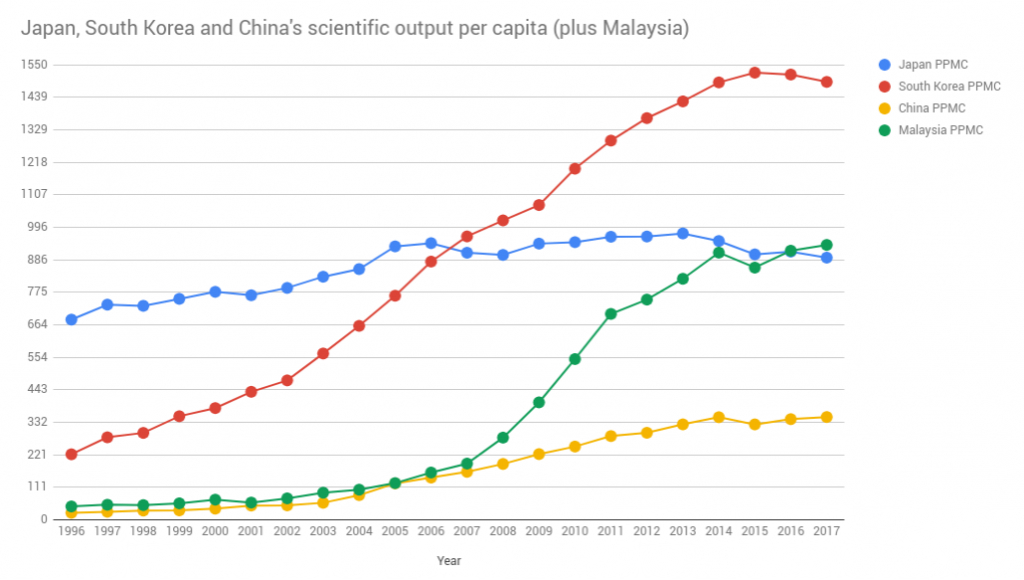
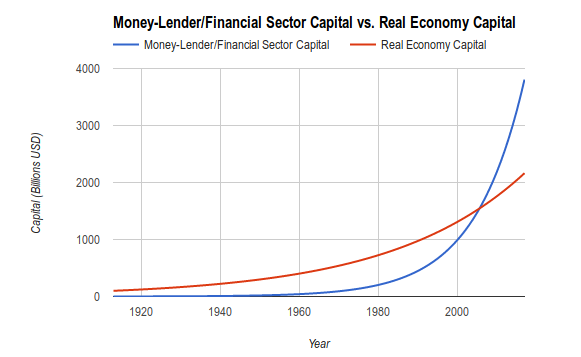
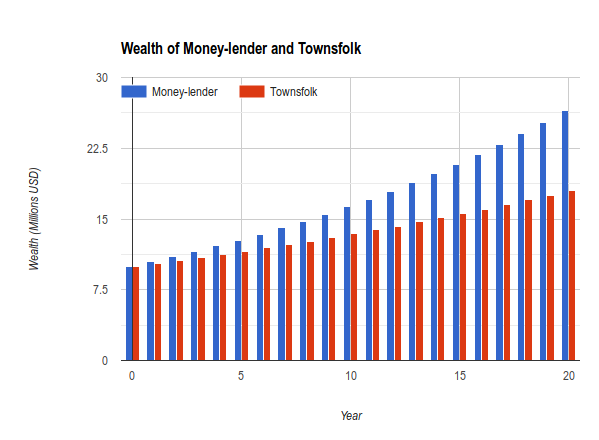


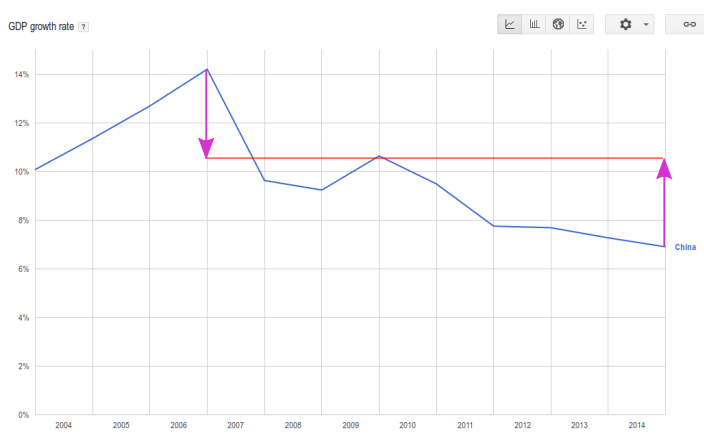
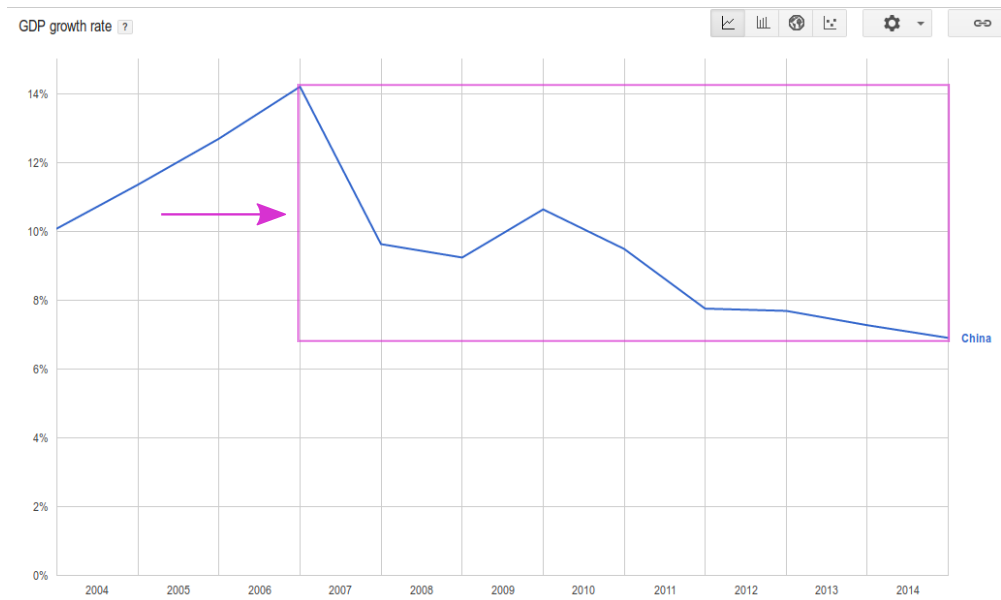
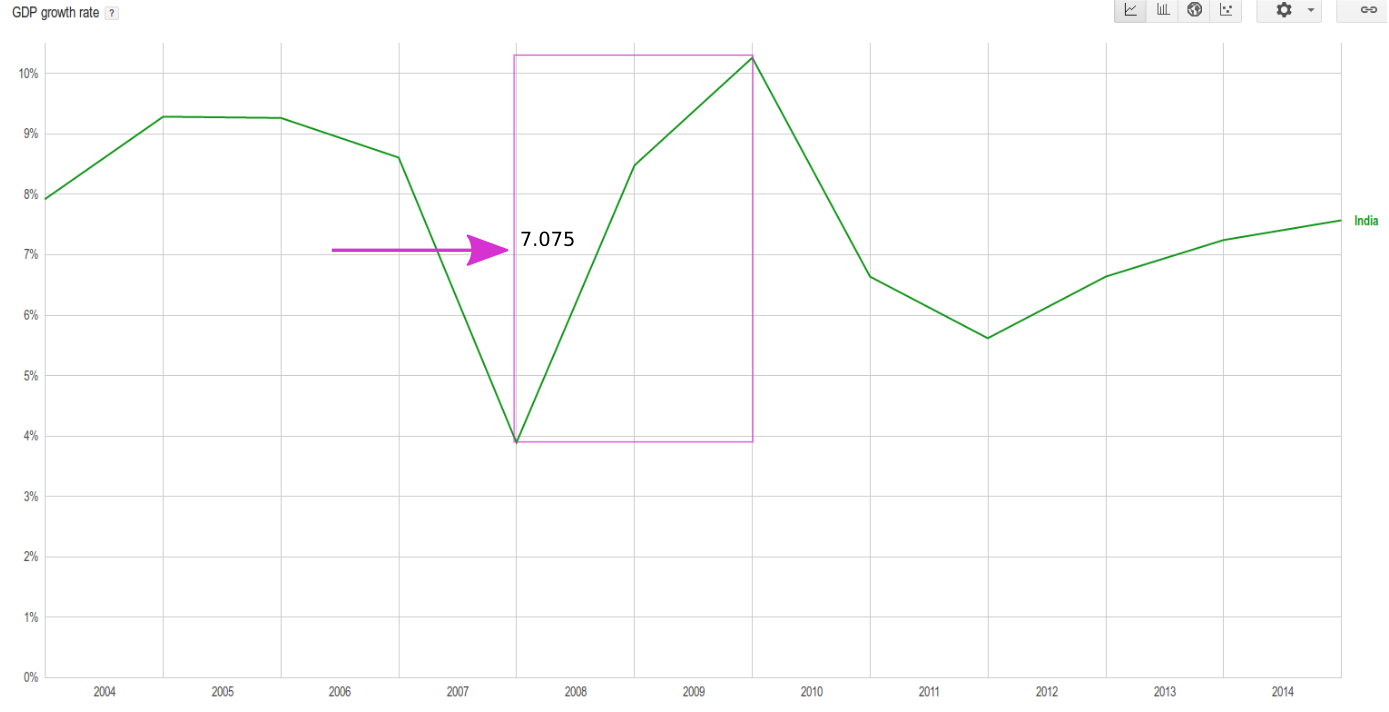
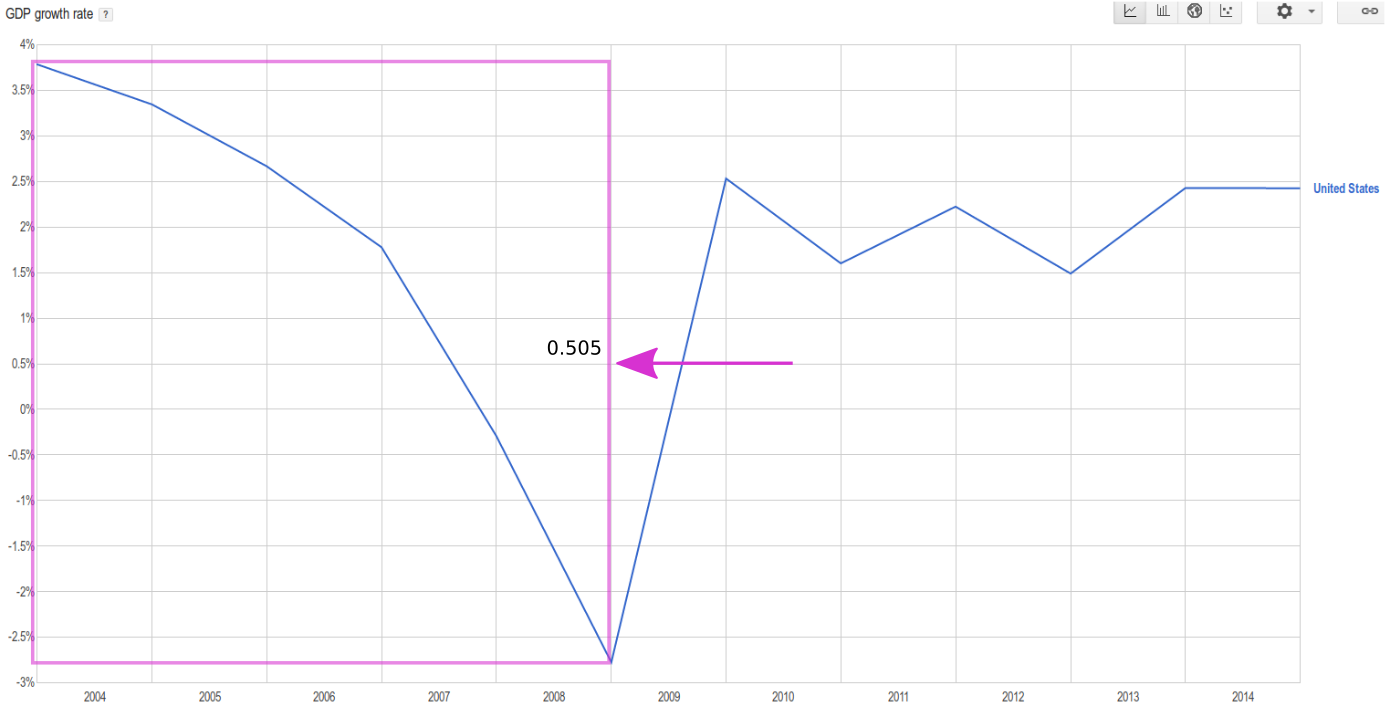
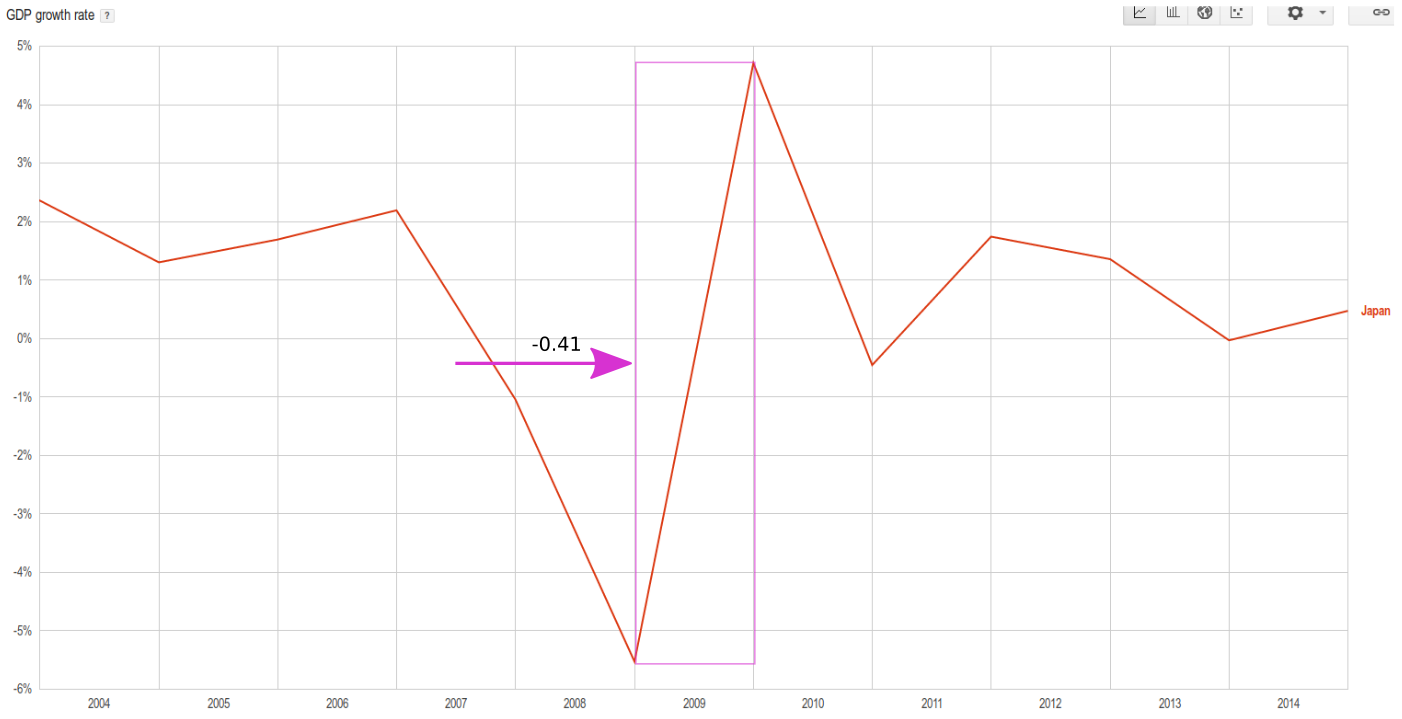
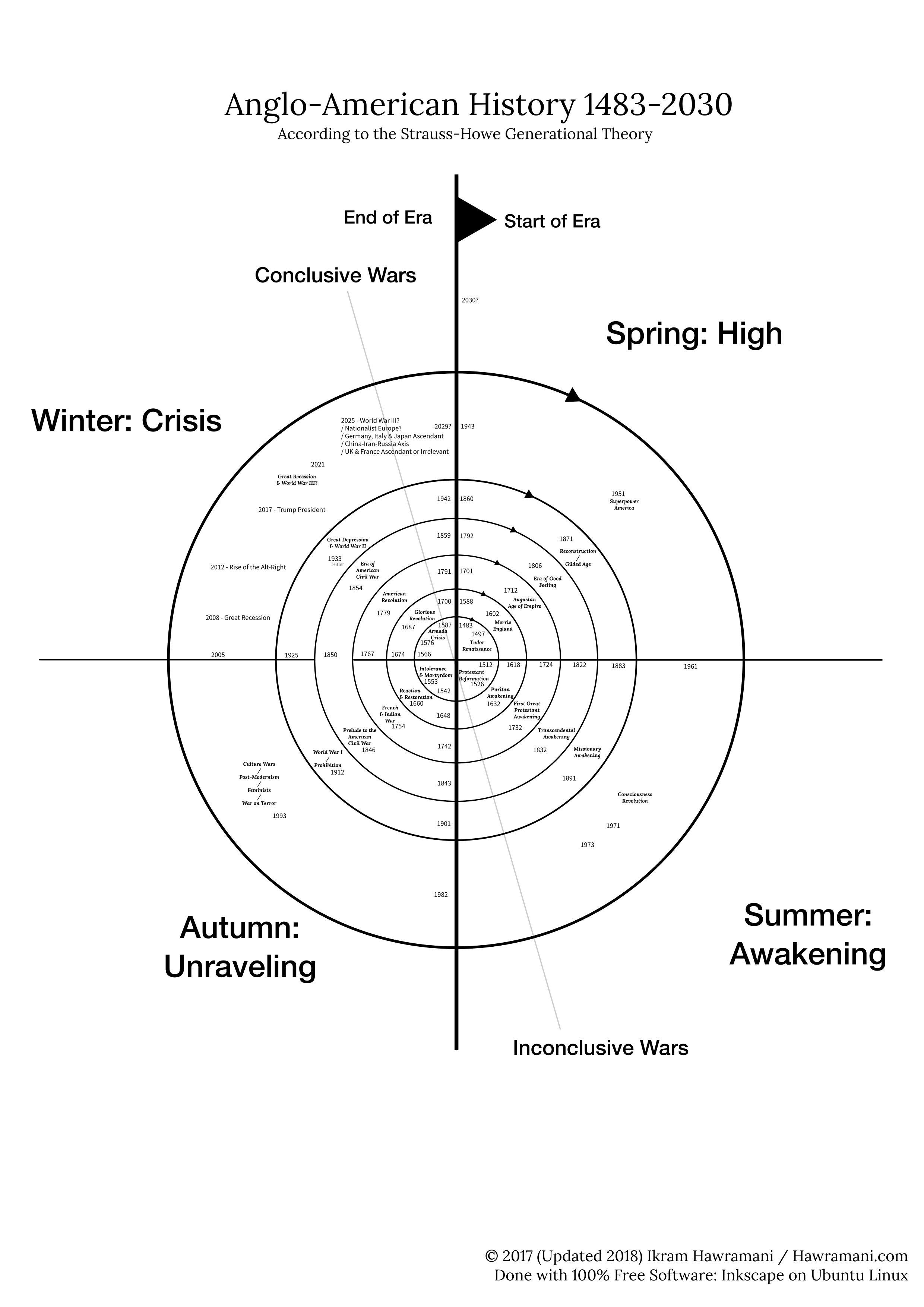
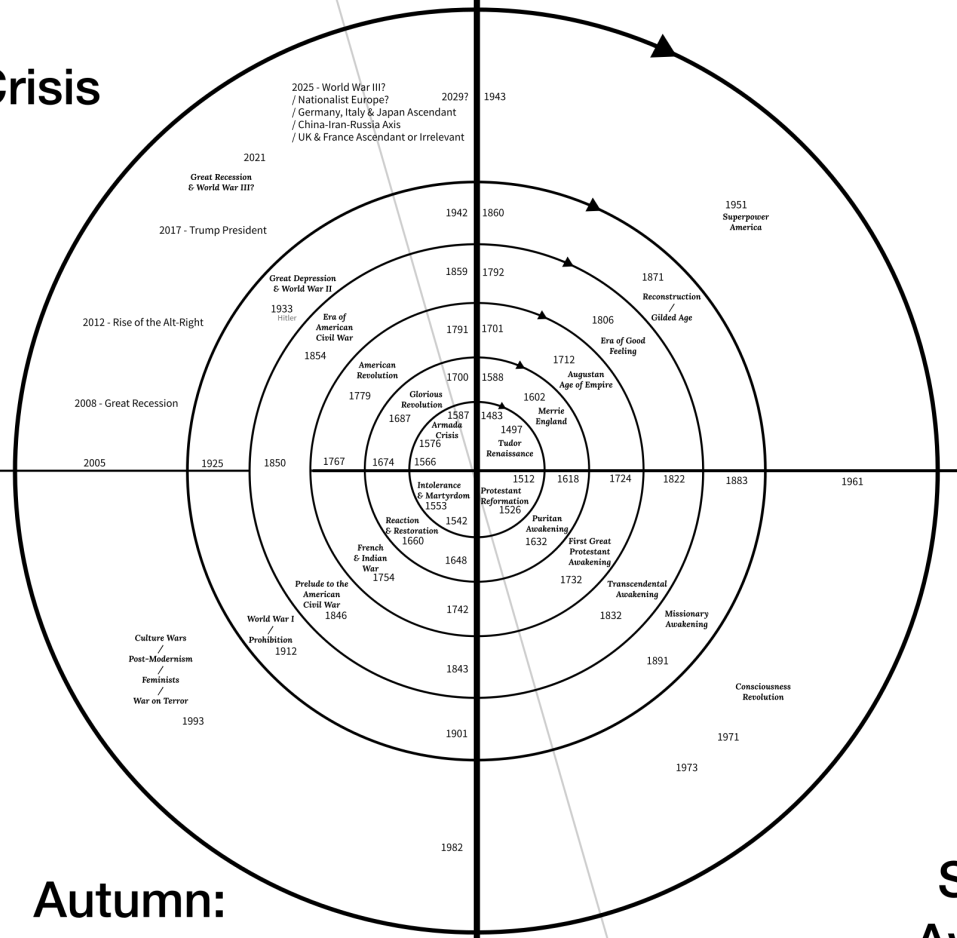 The “saeculum” is the word that Strauss-Howe use for each circle of the chart above, four seasons together make one saeculum. A saeculum is generally the length of one human life time, and its regularity has been noted since ancient times. We are currently living at the end of the saeculum that started in 1943, and which will probably end sometime between 2025 and 2035.
The “saeculum” is the word that Strauss-Howe use for each circle of the chart above, four seasons together make one saeculum. A saeculum is generally the length of one human life time, and its regularity has been noted since ancient times. We are currently living at the end of the saeculum that started in 1943, and which will probably end sometime between 2025 and 2035.